#Mosses from an old manse
Text
[...] the intense morbidness which now pervaded his nature.
Nathaniel Hawthorne, Mosses from an Old Manse; from 'Egotism; Or, The Bosom Serpent'
124 notes
·
View notes
Text
Dirty Work 41

Warnings: this fic will include dark content such as bullying, familial discord/abuse, and possible untagged elements. My warnings are not exhaustive, enter at your own risk.
This is a dark!fic and explicit. 18+ only. Your media consumption is your own responsibility. Warnings have been given. DO NOT PROCEED if these matters upset you.
Summary: You start a new gig and find one of your clients to be hard to please.
Characters: Loki
Note: it's thursday and i'm thirsty.
As per usual, I humbly request your thoughts! Reblogs are always appreciated and welcomed, not only do I see them easier but it lets other people see my work. I will do my best to answer all I can. I’m trying to get better at keeping up so thanks everyone for staying with me.
Your feedback will help in this and future works (and WiPs, I haven’t forgotten those!) Please do not just put ‘more’. I will block you.
I love you all immensely. Take care. 💖

You have no tears left. When you’re still and silent, standing in Odin’s arms, slumped against him, the birds sing a little louder and the sun shines a little bright. You feel almost cleansed despite the hollow at the pit of your stomach. You lift your head and wipe your damp cheeks as he slowly lets his embrace fall away from you.
You sniffle and peer back through the garden, towards the house. You’e not ready to face them all, not with puffy eyes and a heavy heart. Odin pats your shoulder gently, rubbing your arm as he coos your name.
“I have something else to show you,” he says and offers his hand.
You take it and gulp down the last of your grief. He turns you away from the great Odinson manse and leads you around the fountain. Leaves rustle softly and the water trickles soothingly. He guides you down a path hidden behind a cluster of bramble, overgrown with moss and ivy, littered with winged samara and sprouting blooms.
The noise of the fountain fades behind you as you enter an archway formed by outstretched maple branches, canopied in the spring leaves. There’s a small structure ahead shrouded in purple wisteria. A gazebo, smaller than that on Laufeyson’s property, forged in stone with rounded windows upon each side. Within, the walls have benches jutting out, another doorway opposite the entrance, looking out into a shadow swath of untrimmed foliage.
“It is old, a bit unkempt, much like myself,” he chuckles as he lets you go.
“It’s beautiful,” you preen as you admire the neat lines between each stone block, “wonderful… I… I love it.”
“It’s a perfect hiding place,” he muses, “a perfect place to have one’s breakfast without disturbance.”
You turn to him, a question stitches between your brows.
“I will fetch you tea? Yes? Perhaps some fruit and something more substantial?”
“I…”
“Dear, you think overly much of others and not enough of yourself. Sit, enjoy your solitude while you can, and I will return with all you need,” he insists.
“I can’t, Mr. Lauf–”
“You let me worry for my son,” he interjects. “I’ve no doubt his part in your despair.”
You don’t argue further. You wouldn’t dare. You lower your head and sit along the stone bench against the wall and turn to peer out the window. It is wonderful there. Like a little world of your own.
You glance over but he’s already gone. You barely even heard him with the buzz of insects and scratch of sneaky critters all around. You turn back to the long window and watch a dragonfly skim along the ground, whizzing up, down, and back and forth. It’s as if you escaped into a book you read as a girl, where everything was magical and spectacular. You don’t think you’ll get a happy ending though.
Your mind wanders through the greenery and back to the house. The bedroom, dark in the small hours of the night, laying awake, staring at the wall, Mr. Laufeyson’s warm breaths puffing into your neck. Those moments when he doesn’t seem so intimidating but remains perplexing. One moment, wrapped around you, the next toying with you like a puppet.
Your core tingles and you bend your legs on the bench, squeezing them together. The sensations swirl in your mind with the shower steam. As delightful as it all was, your heart rents with shame. The way he left you on the tile, the expectation you would get yourself up and go to him, ready to be used again. As always, you have a duty.
Mr. Laufeyson does not care for you as a person, you doubt you’ll ever be that in his eyes. You are just another possession, like his records on the shelf, or that telescope he polishes so vehemently. Just another number in his collection.
You hear a snap and blow away the anxiety as best you can. You can’t worry about it so deeply, you know what you agreed to. He has given what he’s promised; you’ve been fed, clothed, and housed. You need him more than he could ever need you.
You turn to the doorway as Odin appears again, a tray in his hands. He brings it to the next bench and sets it down. There’s a cup of tea and a stack of square waffles beneath a dusting of sugar and heaps of berries. It smells delicious as your mouth waters for a taste.
“I’ve brought this as well,” he stands straight and takes a book from under his arm, “I hope it will keep you entertained.”
“Oh?” You watch him set it down.
“Today is for you, dear, you won’t be disturbed, I will see to it,” he declares, “Walpurgisnacht approaches and we all must be ready for the spring. Lay the past behind so we can start again.”
You lower your eyes, “thank you, Odin.”
“No need for that,” he says, “I only ask that you do one thing for me,” he nears and pets your head. You peer up at him as you heart seizes. “You will be kind to yourself.”
“I… I’ll try.”
“You should take care of her,” he points to you, “I rather like her a lot and I hate to see those I care for suffer.”
You smile, “I will.”
“Better,” he grins and retreats, “I will be in to check on you periodically.”
“Thank you,” you call after him and he gives a half-salute before he’s off, whistling into the air.
You exhale and let the last of the tension slake away. You drag the tray close and cut into the fluffy stack. You remember how you always wanted a waffle maker. Instead, you always had the frozen waffles you slid into the old overheating toaster. These are much better, they’re sweet and oh so yummy.
Sitting there, in the small gazebo, amidst the wilderness, you feel like a bird in a nest. Safe, cozy, and alone.
✨
You lose yourself in the pages of the book. The sun shifts as you move with it, keeping the ink in its light as you imbibe every word like sweet nectar. It’s like staring in a mirror as you feed on the tale of one, Jane Eyre.
Your literary meditation is splintered by the sudden ripple of a shadow and the clearing of a throat; gentle, almost reluctant to tear through the serenity. You look up at Odin as he stands in the archway, a small curve amidst his thick white beard.
“Apologies,” he says as he comes forward to gather up the tray, “I’m afraid it’s time.”
You deflate and close the book. You stand and hold out the book, “I can get all that.”
“No, no, I can manage,” he assures you, “and that is for you, dear. Keep that as your own.”
“I couldn’t–”
“You have some to go, haven’t you?” He eyes the book, “please, I have enough books.”
You look down at the book and hug it. It’s like a new best friend. You just want to spend all your time amidst its pages.
“Thank you.”
“Whatever you need,” he backs out of the gazebo, “come with me now. Let us put our masks on.”
You giggle and follow him. He says it so well. It’s like slipping back into a costume. You feel the peace chipping away and the tension once more has you rigid. Back to the real world.
“Now, we cannot give ourselves away,” he halts just out of sight of the veranda, “I shall go ahead and you will follow that path,” he turns and nods behind the row of hedges, “follow it around the front and you may slip in.”
“Oh, uh…” You blink and look over your shoulder, “that way?”
“Yes, it will take you right around to the front door.”
“Right, thank you… again.”
He bows his head and steps forward. You turn off in your own escape as the slippers on your feet clap against the ground. You come out in the golden sunshine and tramp across the stonework of the arced drive. As you come up the steps, the door opens from within. You stop at the middle stare and gape up.
“There you are,” Mr. Laufeyson greets, almost an accusation, “where’ve you been off to?”
Your brows pop up and you peer around, “reading.”
“Reading? You couldn’t do so in your room?” He challenges.
“I’m sorry, Mr. Laufeyson. I broke the rules.”
“You broke the rules– get inside,” he points you inside as he steps back. You obey and he snaps the door at your entrance, turning towards you with a finger in the air. “Is that all you have to say?”
“Yes, Mr. Laufeyson, I’m very sorry.”
He sighs and drops his hand, gripping his hip, “where were you reading?”
“Outside.”
“Outside– be straight, where?”
“In the garden,” you say plainly, lips down turned, “I only wanted to watch the butterflies.”
You look up at him, a pout in your lower lip, and bat your lashes. You clutch the book tighter and his eyes fall to squint at it. He reaches and curls his fingers around the top, wiggling it free. He flips it over to read the spine.
“This is a first edition,” he states as he examines, “where did you find this?”
The disbelief in his voice makes you nervous. First edition?
“Is it very old?” You ask.
He winces and looks at you, his green eyes lit, “1847… I’d say so.”
“Oh?” You bat your lashes.
“Not in its original form,” he turns it over, “it’s been rebound into a single volume. The first print was in three parts and this cover… it can’t possibly be so ancient.”
You gulp and purse your lips.
“So I have to wonder, where you found this,” he sneers at you.
“Well, I… your father gave it to me.”
“Gave it to you? To read? He lent it to you?”
“Um, he just said… to keep it as my own,” you shrug.
“Do you--keep it? A first edition Bronte?” He sounds ready to explode, “so that is where you’ve been? With my father?”
“I saw him, Mr. Laufeyson, but I was mostly alone,” you sniff, “I shouldn’t have gone out. I’m sorry. Again.”
“Is that all you’re going to say? Sorry, sorry, sorry?”
You nod, “sorry.”
He closes his eyes and pinches his nose, “you will stay close.” He offers the book back to you, “put this away and put on some proper shoes,” he looks down at the oversized slippers, “I’ve some errands to run for mother and you will come along. Do your duty.”
✨
Mr. Laufeyson is quiet throughout the drive. So are you. You accept your penance and roil in the thick silence, fingers twiddling and twining restlessly. His sighs make you flinch as you await further reprimand.
He pulls in before a shop front of white trimmed in red. He gets out without waiting and you follow after him. You trail him inside as he strolls across to the counter where women in red aprons and caps smile back at him.
“Hello, I’ve come to pick up an order for Odinson,” he declares flatly.
“Frigga? Oh yes,” the shorter of the pair flits into the backroom.
“You don’t remember me?” The other woman asks. Laufeyson’s eyes shoot darts at her and his brows arch.
“I recall you spilled vodka on my wedding shoes, yes,” he scoffs.
“Oh,” she makes a face, “I thought maybe you’d forgotten that part.”
“Mm,” he hums and taps his fingers on the shining countertop.
The other woman returns and slides over a large white box, a red seal stuck along the corner to keep it firmly closed. Laufeyson takes out his wallet, “how much then?”
“Paid for,” the woman proclaims, “all yours.”
“Right,” he slides the box off and pivots smoothly.
You peer back before you scurry ahead of him to the door, opening it as his hands are full. That woman was at his wedding? Did she know Sif? Was it a big event? Did everyone go? You don’t ask any of the questions that flood your head. You’d rather not know.
He balances the box in one hand and reaches into his pocket for his keys, unlocking the trunk. He tucks the box firmly against the emergency kit to keep it in place.
“Whatever it is, it should be kept cool in here,” he shuts the lid, “though I wonder why mother couldn’t have it brought with tomorrow’s delivery.”
You don’t say a word. You wouldn’t know either. He strides back along the side of the car and dips into the driver seat. You mirror him as you get in on the passenger’s and he presses the button to turn the engine. He sighs and rests the heel of his hand on the steering wheel. He glances in the rear view.
“I’ve another stop to make.”
That’s all he says. It isn’t a question, just a statement. Though you wonder why he even made the declaration. You don’t need to know, you just go along.
He backs out and rolls out of the lot into the street. You distract yourself with the other storefronts and the veneers of city buildings. He drives onto an avenue and slows along the curb, shifting to a stop before he once more shuts off the engine.
Again, he gets out without instruction. You follow. That’s all you can do. He heads up to the grey brick house. Where are you? It isn’t until you’re at the front door that you notice the metal placard mounted on the wall; Bragi Skald, Antiques and Artifacts.
Laufeyson clangs the large knocker on the door and checks his watch. You wait. It’s quiet. You see no light through the windows but the curtains are drawn flush to the windows, as if they’ve been sealed.
The hinges whine suddenly as the door swings inward, “Ah, Loki!” A blond man at least head shorter than his visitor greets, “wonderful to see you again. I did have it in my ear that you were about, I was curious as you when you should darken my doorway.”
“Bragi,” Laufeyson replies tersely.
“And who is this gorgeous creature,” the man’s crystal blue eyes surprise you as the bow in his lip deepens. He sends you a wink and offers his hand, “forgive me, sweetheart, I nearly missed you there, and how could I overlook such a ravishing woman.”
“Enough,” Laufeyson girds.
“I haven’t even introduced myself–”
“This is Bragi,” Laufeyson introduces the man then utters your name pointedly in return.
“Ah, beautiful name but that hardly answers my curiosity. Who is she? Oh, don’t tell me, you’re marrying again–”
“Hardly,” Laufeyson swipes away the thought with his hand, “I only need to be away from my family.”
“Yes, yes, of course. With Walpurgisnacht, I can only imagine–”
“Be glad you only have to imagine it,” Laufeyson scowls. “Are you going to welcome us in or shall we continue to stand on your porch like tramps?”
“Come, come,” Bragi opens the door wider, “Lady, please, don’t mind the clutter.”
Laufeyson waves you ahead of him. You enter and hold back your shock at the interior. You can hardly see the walls for the stacks of books all around, many with sheaths of paper jutting out. It smells like cinnamon and hint of dust.
“What are we in the mood for? Tea? Or something stronger? I’ve some absinthe–”
“Don’t be mad,” Laufeyson rebukes, “tea will do fine. Just tea, none of your tricks.”
“You speak to me of tricks?” Bragi hums, “is that a sense of humour I sense, oh, dour Loki.”
You lock your jaw to keep from gaping. You’ve never heard anyone talk to Mr. Laufeyson like that, not anyone outside his family, and even Thor did not mock him so lightly.
“Do you want tea?” Laufeyson looks over at you.
“If it isn’t any trouble.”
“Tea,” Laufeyson snaps his fingers at Bragi.
“Do you like scones, lady?” Bragi turns his attention to you.
“I’m not very hungry, thank you–”
“Lady!” A squawk makes you jump, drawing your attention to the flutter of blue feathers that descends to perch on the banister post. A great blue parrot tweaks its head and repeats the word.
“Oh, hush,” Bragi shoos away the bird but only receives a nip of its sharp beak, “don’t listen to Fossegrim. He talks too much.” Bragi shakes his head and retreats down the hallway, “tea, tea, tea…” he chants as if he might forget.
Laufeyson tuts, “he speaks of talking too much…”
You stare up at the blue parrot as it stares back at you. Around its eyes and mouth are bright yellow strips. It’s a pretty creature.
“Lady,” it bawks again and hops off the banister, winging around the space to land on your shoulder.
You gasp as Laufeyson takes a step back. He just sends a troubled look to the bird and glances around, “in here,” he points you through the doorway behind him.
“Um…” you move carefully, trying not to disturb the bird.
In the next room, a large harp stands in one corner, a piano the other, and a litter of various instruments on shelves mounted on the walls. There’s a twelve-string guitar on the sofa, leaned against the armrest as if it was left there haphazardly.
“Be very careful,” Laufeyson returns, “it bites.”
“Bite!” The parrot squawks and snaps in Mr. Laufeyson’s direction. He sighs and once more eludes the bird’s breadth.
“Wish he’d lock that thing up,” he mutters.
You stand like a statue, nervous. You turn your head slowly to look at the parrot. It leans in and nuzzles your hair. You stay as you are, paralysed as you fear it might snap at you too. A grating chitter rises from its throat, softer than its former screech. It continues the purrlike noise as it rocks on your shoulder.
“Is it singing?” You ask as Laufeyson stares with arms crossed.
“I have no idea. Let’s hope it’s not growling.”
You frown and clasp your hands tight. If the bird keeps Mr. Laufeyson away, it can’t be so bad.
#loki#dark loki#dark!loki#loki x reader#fic#dark fic#dark!fic#dirty work#series#au#maid au#avengers#mcu#marvel#thor
208 notes
·
View notes
Text
Books I Read in 2024, #8: Moby Dick (Herman Melville, Independent Publisher (originally Harper & Brothers), 1851)
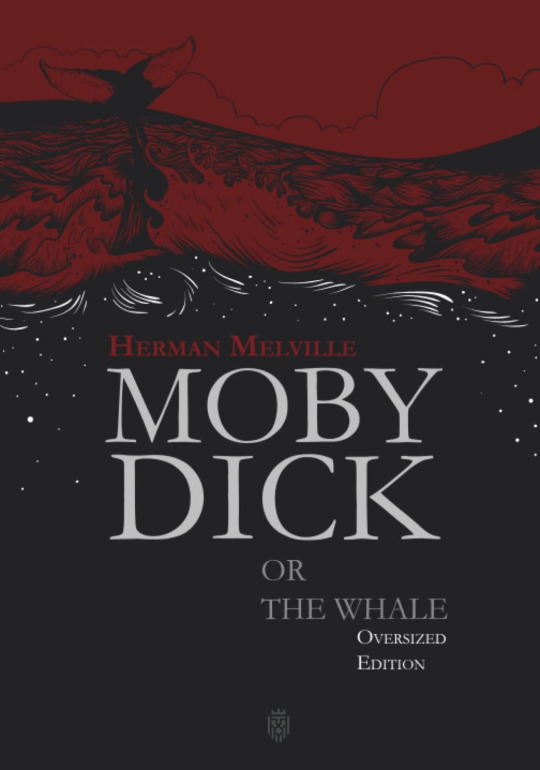
A sprawling narrative of the narrator Ishmael's time on the whaling ship Pequod, Moby Dick is the story of Captain Ahab's obsessive quest for revenge upon the whale that maimed him. Drawing upon elements of contemporary naturalist writing of the world and whaling, Ishmael paints a sharp picture of the whaling culture and industry of the time and it's foibles and the world it brought into being.
You'll be able to tell eventually based on my to read list, but Limbus Company is partly to blame for my reading this one. I'd long thought about going back to classics, and have done so plenty in the past, but the game by one of my favorite developers drawing upon 12 different classics of literature from across the world was a pretty good reason go step it up a bit more.
And in fact, this one was meant to be posted before Wuthering Heights, but I got swept up in how good that book was and posted it first right after finishing it. Which is not to say that this isn't good. Moby Dick is a fucking banger. Truly crazy. May have given me some grist to work with in some other projects, even.
Moby Dick is a sprawling bastard of a novel, at times lapsing into stage direction, epistolary and direct address of the audience by Ishmael, our near-silent and yet deeply wordy narrator. It feels like the production of a hyperfixation (which on some level it is) and a genuine love for the material, a piece of rock carefully sculpted around a vein of gold that gives you glimpses of what lies underneath without simply laying it all bare. Moby Dick is a novel of small, momentous moments.
Famously, Herman Melville made significant changes to the novel after speaking with Nathaniel Hawthorne (author of Mosses from an Old Manse) to deepen it and draw in elements of human nature, more directly drawing a parallel between Ahab and Moby Dick as a war between Man and God. It's probably felt the strongest in the beginning and the end, when faith and circumstance are both questioned the most. Ishmael is warned against the black end that is coming for the Pequod by Elijah but cannot begin to fathom the reason why, but by the time they arrive in the seas of Japan to hunt Moby Dick, Ahab has forged a harpoon quenched in blood in the name of Satan to slay his foe.
Much of the body of the novel is an exhaustive, frankly beautiful description of the circumstances of whaling, oceangoing and the process of whaling across the world. It would be a mistake to say that this is not necessary to the narrative, though I can imagine so many teens being forced to read this in high school english finding the task tedious in the extreme. And yet, it informs the story directly. Without these things, you would not come to an understanding of Ishmael himself, though it would seem superfluous. It's a labor of utmost love for the people who do this frankly insane and borderline suicidal thing, something that was considered necessary for the time by society at large and represented unerringly in its brutality and horror.
And yet, the novel understands that the pervasive whaling is on some level evil. Moby Dick is a punishment by God himself, a brilliant white avenger of humanity's evil. It strikes like the wrath of god when other whalers engage in the act against other shoals, utterly devastating and driving off the virtuous and sinful in equal measure. The other boats that encounter Moby Dick all survive because they fear it, the representative of God upon the ocean. Only Ahab's singular obsession drives him to ruin, even in the face of being offered the opportunity to repent in the form of the Rachel, the opportunity to turn away from ruin in the pursuit of saving a human life imperiled before them.
The fault lied within you all along, Ahab.
9 notes
·
View notes
Text
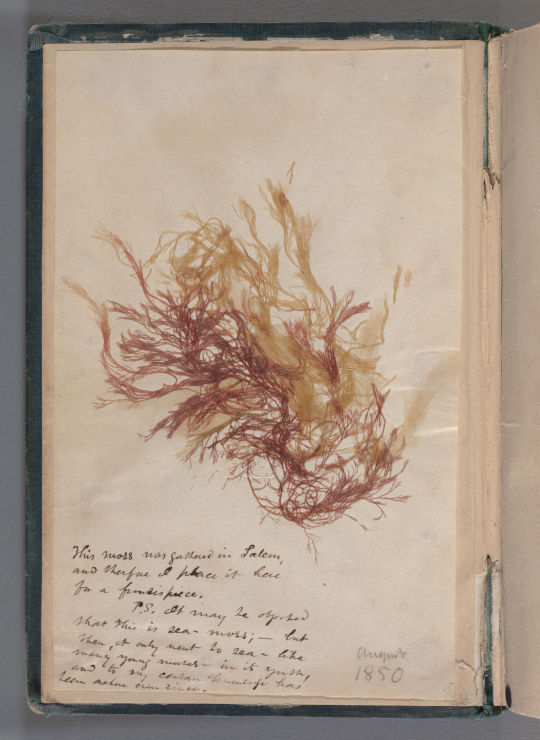
This moss was gathered in Salem, and therefore I place it here for a frontispiece.
P.S. It may be objected that this is sea-moss;—but then it only went to sea—like many young mortals—in its youth, and to my certain knowledge has been ashore ever since.
Herman Melville's marginalia in Nathaniel Hawthorne's Mosses from an Old Manse. Image from Houghton Library, Harvard University.
9 notes
·
View notes
Text
OOF. I read Nathaniel Hawthorne's The Blithedale Romance. I had read that there were hints of Melville in one of the characters. ........... this entire book... need to infodump.
It is not, I apprehend, a healthy kind of mental occupation to devote ourselves too exclusively to the study of individual men and women. If the person under examination be one's self, the result is pretty certain to be diseased action of the heart, almost before we can snatch a second glance. Or if we take the freedom to put a friend under our microscope, we thereby insulate him from many of his true relations, magnify his peculiarities, inevitably tear him into parts, and of course patch him very clumsily together again. What wonder, then, should we be frightened by the aspect of a monster, which, after all,—though we can point to every feature of his deformity in the real personage,—may be said to have been created mainly by ourselves.
forgive me...
For what it's worth, the book is of course a work of fiction, and I am not drawing any conclusions about real life events. But the ideas considered......
Interesting things to know
Nathaniel Hawthorne (1804-1864) and Herman Melville (1819-1891) met August 5, 1850 and initially liked one another very much and became good friends. They lived near one another for a time. (blithedale romance written after hawthorne left in 1851? left perhaps abruptly?)
In 1846, Hawthorne had reviewed Melville's Typee (the full review is reprinted in Melville, the Critical Heritage, edited by Watson G. Branch):
This book is lightly but vigorously written; and we are acquainted with no work that gives a freer and more effective picture of barbarian life, in that unadulterated state of which there are now so few specimens remaining. The gentleness of disposition that seems akin to the delicious climate, is shown in contrast with the traits of savage fierceness...He has that freedom of view—it would be too harsh to call it laxity of principle—which renders him tolerant of codes of morals that may be little in accordance with our own, a spirit proper enough to a young and adventurous sailor, and which makes his book the more wholesome to our staid landsmen.
Melville wrote very passionately to and about Hawthorne. The following paragraph is from "Hawthorne and His Mosses," a review which Melville wrote for The Literary World of Hawthorne's short story collection Mosses from an Old Manse. The article was published in two parts August 17th and 24th, 1850, written from the point of view of a "Virginian spending July in Vermont" who had never met Hawthorne and was unlikely to do so. In fact, Hawthorne and Melville had met the month of the publication of the article ("Several Days in Berkshire, Part II, The Mountain Festival" in The Literary World, August 31st, gives an account of the party), and it seems that the editor, Evert Augustus Duyckinck, who had also been part of that gathering, had urged Melville to publish a review. It is unknown whether Melville started writing it before or after the meeting. (See also Hawthorne's letter to Duyckinck regarding the review.)
Twenty-four hours have elapsed since writing the foregoing. I have just returned from the hay mow, charged more and more with love and admiration of Hawthorne. For I have just been gleaning through the "Mosses," picking up many things here and there that had previously escaped me. And I found that but to glean after this man, is better than to be in at the harvest of others. To be frank (though, perhaps, rather foolish), notwithstanding what I wrote yesterday of these Mosses, I had not then culled them all; but had, nevertheless, been sufficiently sensible of the subtle essence, in them, as to write as I did. to what infinite height of loving wonder and admiration I may yet be borne, when by repeatedly banquetting on these Mosses, I shall have thoroughly incorporated their whole stuff into my being,—that, I can not tell. But already I feel that this Hawthorne has dropped germinous seeds into my soul. He expands and deepens down, the more I contemplate him; and further, and further, shoots his strong New-England roots into the hot soil of my Southern soul.
There is this letter from Melville to Hawthorne dated July 17, thought to be from 1852. Hawthorne's book that was just published, within the previous week or so, based on advertisements in The Literary World, was this one, The Blithedale Romance.

My Dear Hawthorne: — This name of "Hawthorne" seems to be ubiquitous. I have been on something of a tour lately, and it has saluted me vocally & typographically in all sorts of places & in all sorts of ways. — I was at the solitary Crusoeish island of Naushon (one of the Elisabeth group) and there, on a stately piazza, I saw it gilded on the back of a very new book, and in the hands of a clergyman. — I went to visit a gentleman in Brooklyne, and as we were sitting at our wine, in came the lady of the house, holding a beaming volume in her hand, from the city — "My Dear," to her husband, "I have brought you Hawthorne's new book." I entered the cars at Boston for this place. In came a lively boy "Hawthorne's new book!" — In good time I arrived home. Said my lady-wife "there is Mr Hawthorne's new book, come by mail" And this morning, lo! on my table a little note, subscribed Hawthorne again. — Well, the Hawthorne is a sweet flower; may it flourish in every hedge.
I am sorry, but I can not at present come to see you at Concord as you propose. — I am but just returned from a two weeks' absence; and for the last three months & more I have been an utter idler and a savage — out of doors all the time. So, the hour has come for me to sit down again.
Do send me a specimen of your sand-hill, and a sunbeam from the countenance of Mrs: Hawthorne, and a vine from the curly arbor of Master Julian.
As I am only just home, I have not yet got far into the book but enough to see that you have most admirably employed materials which are richer than I had fancied them. Especially at this day, the volume is welcome, as an antidote to the mooniness of some dreamers — who are merely dreamers — Yet who the devel aint a dreamer?
H Melville
My rememberances to Miss Una & Master Julian — & the "compliments" & perfumes of the season to the "Rose-bud."
And I am once again bringing up Melville's poem "Vine and Clarel" (1876)............ Vine who is considered to have been based on Hawthorne.......
Nobody knows exactly why they grew apart. Hawthorne's family apparently always thought very highly of Melville, even after their friendship ended (source: Hawthorne, A Life by Brenda Wineapple).
I will shut up about Melville now, and if you'd like, you might check out my post about "Bartleby the Scrivener."
The Blithedale Romance
I shall be kind of vague so as not to give away too much of the story. I thought the book was very good, and every chapter was full of suggestion and pain. Even though I had guessed many of the plot points, the way it was written blew me away. Every time I thought, "Surely you can't have more to discuss," there was indeed more, to the very end!
I think maybe this is a poor excuse for a summary or analysis, but here it is anyway. Let's begin.
The community aims to build a new system for society, and their system seems very liberal in regard to gender roles. On arriving, the question is asked, "Have we our various parts assigned?" and the answer is that, at the start, women will do the work that traditionally falls to women, and men will do the work that traditionally falls to men, but they may eventually swap according to their individual strengths.
One girl seems to idolize another woman, apparently because of the woman's writing. The narrator says that there is nothing so beautiful in a masculine nature. okay.
The narrator's male friend is a philanthropist, and the cause to which he is dedicated is the reformation of criminals (!!), and the world looks down on his cause, but later he is sometimes defended by other characters. He is popular with the women (and the narrator understands: "If she thought him beautiful, it was no wonder. I often thought him so, with the expression of tender human care and gentlest sympathy which she alone seemed to have power to call out upon his features."), but the friend is devoted to his cause.
The narrator speculates about the sexual past of another friend (a woman), and becomes uncomfortable, but he criticizes himself for speculating, more than he criticizes her (only in his own mind), because he says he had no right or reason to be thinking of her in that way.
The narrator reproaches himself for prying into the secrets of his friends, because he has become suspicious of the male friend, and has come to wonder if the friend had an ulterior motive of getting him to join his cause in caring for him (ow and how passionate and bittersweet was that scene describing his care). He feels guilty for suspecting, and yet he keeps considering... this friend whom he repeatedly says he loves, whom he describes as having something feminine in his nature which gives him his tenderness, and whose tenderness he has said "few men could resist and no woman"...
While inclining us to the soft affections of the golden age, it seemed to authorize any individual, of either sex, to fall in love with any other, regardless of what would elsewhere be judged suitable and prudent.
The narrator has a secret hideaway which he considers a fitting place to bring a bride for a honeymoon, and then the person he names as a potential guest, the person with whom he "could think of sharing all," is the male friend.
Unrequited love is a recurring theme. The coldness of the loved one toward the one who loves, and how tragic and cruel it is that someone should love, or need something from, someone who cannot reciprocate... Every major character is in at LEAST one such relationship, but the narrator is never shown to be acting in the position of the lover.
The narrator learns of a woman's apparent tragic love for an abhorrent man—a man whom the narrator has just likened himself to and said he detests for bringing out his own cruelty—and resolves "that to no mortal would I disclose what I had heard. And, though there might be room for casuistry, such, I conceive, is the most equitable rule in all similar conjunctures."
The legend... once again: curious, insincere man, you may find out, but once you know, you are doomed to be unhappy.
The narrator is cruel at times, and even sometimes shows that attitude of "why do girls go for guys who don't respect them, why don't they like nice guys like me," but I don't hate him for it. He is flawed, he knows he is flawed, and he is meant to be flawed. I KNOW I'm projecting now, but the narrator has this self-deprecating mindset, and his judgment of himself seems almost even more harsh than his judgment of others. He puts himself down, and yet he can't bear to be insulted. He seems to want to be good, and yet he says unkind things. He seems to think himself unlikable, and maybe it's a self-fulfilling prophecy. He feels like an outsider. He needs to escape from people. Well. I feel like I understand, or like he understands. It hurts, and I'm trying, too.
THE "CRISIS." THE AFTERMATH. I CANNOT SUMMARIZE OR SELECT A QUOTE FOR THIS ONE. YOU WOULD HAVE TO READ IT. FUCKING HELL. I knew it would happen, and still. These chapters are so dense with the struggle, when the whole book is already dense with the struggle...
GOD. i really can't get started on it or else i won't stop. ALL of it. a summer that can never repeat!! no, i must stop!!
anyway.
Reality and true character are kept hidden away behind the show put on for the world (and after the external coldness and the internal struggle).
The narrator appreciates the sight of a conventional family, after he has just remarked that it hardly seemed worthwhile for them all to exist when they are all so alike. And then he notices this bird all alone in the cold and rain, and wonders why she doesn't go to be warm at home with her family. How like him she seems, then and even now, for our narrator told us at the start that at the time of his writing he is an old bachelor.
And then the narrator dreams of the male friend and the woman friend passionately kissing one another over his bed, and the girl friend sadly watching. He feels the ache of what he misses, and, looking back later, thinks that if he erred in regard to his friends, "it was through too much sympathy, rather than too little."
The narrator talks about how he thought himself a fitting witness for his friends (one loves the other despite the impropriety! despite that one—or in a way, each of them—is perhaps already pledged to someone else!), and if he were their judge, he might have condemned them, and he might have had them punished, and yet it would have been "mournfully, and with undiminished love," and "after all was finished, I would come as if to gather up the white ashes of those who had perished at the stake, and to tell the world—the wrong being now atoned for—how much had perished there which it had never yet known how to praise."
I happen to be reading the Penguin Classics edition, which adds back in a few things deleted from the original manuscript thought to have been removed due to Hawthorne's wife's disapproval of alcohol. The narrator's musing on temperance, omitted in the regular edition... "Human nature, in my opinion, has a naughty instinct that approves of wine, at least, if not of stronger liquor." "The reformers must make their efforts positive, instead of negative; they must do away with evil by substituting good." AGHHHH. The rest of the scene seems to be the same in both editions. The narrator then describes the paintings in the saloon. When I read it, I thought one could describe Moby-Dick in a similar way. and then. well. Homoerotic descriptions of what goes on at a saloon. A suggestive conversation. Whatever that fish thing was.
OOF. THE PAIN OF LETTING GO, THE HOLDS PEOPLE HAVE ON US.
Pessimism and warnings against evil... oof it is suggestive and dark... There is a "Satanic" dance scene, described in an unmistakably sexual way, and the participants beckon him...
The trial... the rejection and accusation... "God be judge between us," the one who judges and the characteristics of that person... the one who is deemed innocent (the one who tempts?)... there is the commentary that woman is more harshly judged than man, but also:
It suits me not to explain what was the analogy that I saw or imagined between [her] situation and mine; nor, I believe, will the reader detect this one secret, hidden beneath many a revelation which perhaps concerned me less. In simple truth, however, as [she] leaned her forehead against the rock, shaken with that tearless agony, it seemed to me that the self-same pang, with hardly mitigated torment, leaped thrilling from her heartstrings to my own.
..............
The ugly spectacle of a heartbreak............ what is all of this if not an ugly spectacle of a heartbreak....
God's forgiveness...
that moral...
that confession. HEAD FULL MANY THOUGHTS.
From the introduction by Annette Kolodny:
By the time he had finished his writing, however, Hawthorne seemed no longer certain that "the Community," by itself, constituted the central interest of his story. The manuscript that he sent on May 2, 1852, to his friend, the literary critic Edwin Percy Whipple, had "Hollingsworth: a Romance" on the title page. In the covering letter to Whipple, Hawthorne suggested other titles, none of which pleased him, and he hoped that "just the thing" would "pop into [Whipple's] mind." Whipple's reply no longer exists, so we cannot know whether his remarks influenced the choice of title. And we cannot know whether Whipple's response to the manuscript prompted Hawthorne's subsequent decision, as he put it in his notebook, to "modif[y] the conclusion," thereby lengthening the text by two handwritten pages. (The modification was probably the addition of the final chapter, "Miles Coverdale's Confession.")
well. much to think about. Melville's Pierre is on my to-read list.
4 notes
·
View notes
Note
i loved reading the scarlet letter, do you know if he has any other books?
Same! & absolutely! He actually has many, but my favorites are 'The House of the Seven Gables', 'The Marble Faun', and 'Mosses From An Old Manse & Other Stories'!
2 notes
·
View notes
Text
I just finished watching the "Woodlands Dark and Days Bewitched" folk horror documentary by Severin Films, and I made a list of some of the books and stories mentioned!
I tried to include book eBook and eAudiobook versions of all of the books/stories!
https://gutenberg.org/ebooks/author/1370 - "The Willows" & "The Wendigo"
https://archive.org/details/TheThrillOfHorror1975LennySEXciter/mode/2up - "Pallinghurst Barrow" & "Randalls Round"
https://gutenberg.org/ebooks/8486 & https://librivox.org/ghost-stories-of-an-antiquary-by-m-r-james/- M. R. James (Ghost Stories for Christmas)
https://librivox.org/lovecrafts-influences-and-favorites-by-various/- "The White People" and "The Willows"
https://gutenberg.org/ebooks/25016 - "The White People"
https://gutenberg.org/ebooks/2048 - "The Sketch-Book of Geoffrey Crayon "
https://gutenberg.org/ebooks/8223 - "Edgar Huntly; or, Memoirs of a Sleep-Walker"
https://librivox.org/mosses-from-an-old-manse-by-nathaniel-hawthorne/ & https://gutenberg.org/ebooks/512 - "Young Goodman Brown"
https://gutenberg.org/ebooks/3623 - "The Golden Bough: A Study of Magic and Religion"
Here you all go! Happy reading!!!
#woodlands dark and days bewitched#horror#folk horror#horror books#audiobooks#digital audiobooks#ebooks#digital books#books#Severin Films#horror ficiton#All the Haunts Be Ours
6 notes
·
View notes
Link
Check out this listing I just added to my Poshmark closet: Mosses From An Old Manse Nathaniel Hawthorne Antiquarian HB Book.
0 notes
Text
Chapter 23: Revolutions on a Rainy Day
Welcome back to my Totally Lit Road Trip blog, where the lit stands for literary!
Today was our second full day in Concord, MA, and despite the steadily increasing rain, we managed to pack in a ton of literary sightseeing.
Our first stop was The Old Manse, a residence where both Ralph Waldo Emerson (who preferred to go by Waldo) and Nathanial Hawthorne lived at some point in their lives. Our tour guide was so knowledgeable and since it was just me and Jess on this tour, it was like having a private guide all to ourselves again.
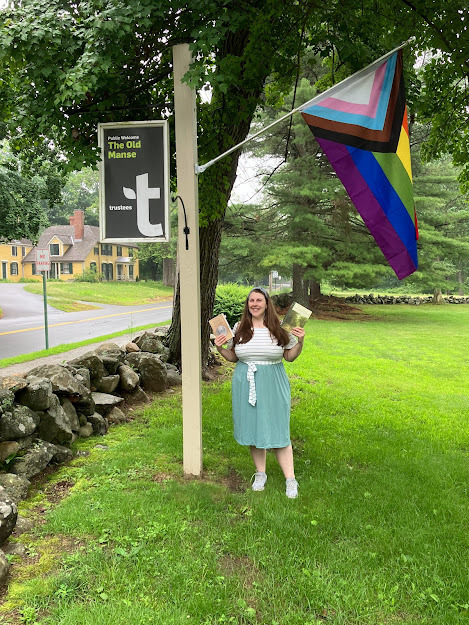
The first thing our guide stressed was that historians see The Old Manse as the birthplace of two different revolutions - The American Revolution, and the Cultural Revolution of Transcendentalism. The home was built in 1769 by Rev. William Emerson (Waldo’s grandfather), who was the minister of Concord. He married the former minister’s daughter, Phebe Bliss. Known as the “Patriot Preacher,” Rev. Emerson was heavily into politics and supported the revolution, making him very popular with his congregation.
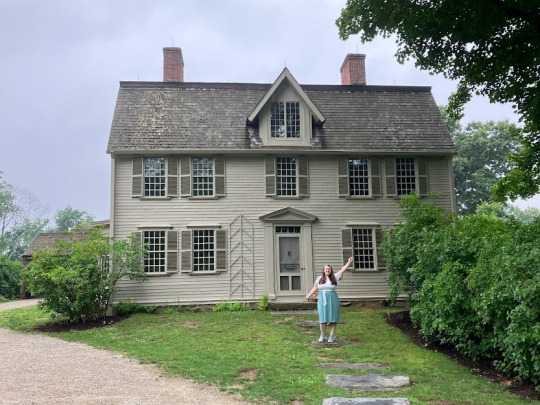
From the window of one of the upstairs bedrooms that would later become Waldo’s bedroom/study, Phebe Emerson and her five children, one of whom would become Waldo’s father, could see the literal beginning of the American Revolution - the first shots fired at the North Bridge. Years later, Waldo would coin the term “the shot heard round the world” in his 1837 poem “Concord Hymn,” which commemorated the Battles of Lexington and Concord.
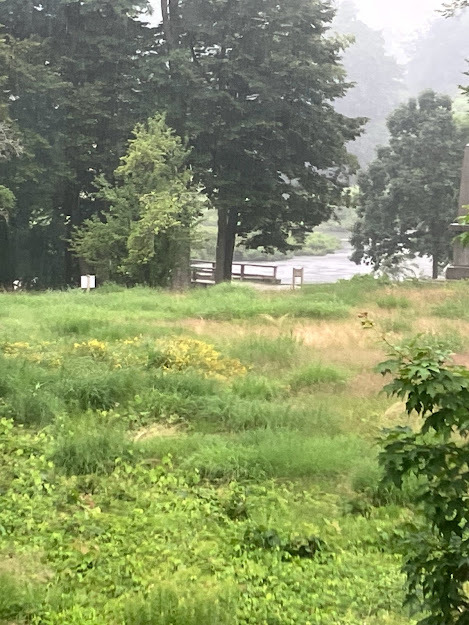
Like his father and grandfather before him, Waldo’s first career path was that of a preacher, however, after the death of his first wife Ellen after only 18 months of marriage, Waldo felt he no longer had the calling of being a minister. Instead, he traveled around Europe for almost a year, meeting other leading authors of the time period, and beginning to shape his philosophies. From this point on, most of his income came from writing and speaking engagements.
After the death of his grandfather, Waldo’s grandmother Phebe remarried, and it was years later when Waldo moved back to the house as an adult to care for his aging step-grandfather. During this time, he wrote “Nature,” the speech considered to be a founding text of the Transcendentalism movement.
Waldo was actually the person who suggested that Nathanial Hawthorne and his wife Sophia be taken on as renters of the home, and Hawthorne is the one who gave it the name “Old Manse”, manse being the British term for a minister’s home. Hawthorne and his wife, Sophia, lived there for about three years, during which he wrote the stories that would eventually come together to form his first successful book, Mosses from an Old Manse. He insisted on writing in the same room of the house which Waldo used as his study, although he had his desk face the wall because unlike Waldo, Hawthorne found nature to be distracting rather than inspiring. Sophia, and accomplished artist, spent much of her time in the house painting. Unfortunately, her last portrait, which she considered to be her best, is of whereabouts unknown.
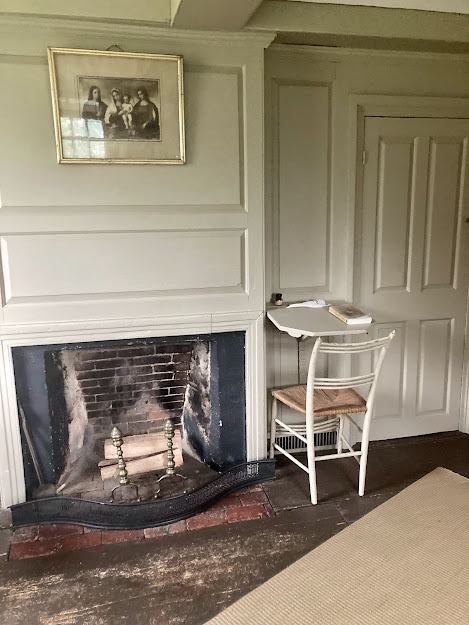
The Hawthornes were eventually evicted because they were unable to continue paying their rent, due to a dry spell of both writing and artistic income. But they left their lasting marks on the home: Sophia engraved window panes with her diamond ring, and Nathanial left a hole in the house where he installed a stove in the kitchen. (He took the stove with them when they moved out.)

After this the Hawthornes moved to Salem, MA, where Nathanial would go on to write House of the Seven Gables and The Scarlet Letter, arguably his most famous work of fiction. They later moved back to Concord and lived at The Wayside, which is unfortunately not currently open to the public.
One of my favorite things in the house was a Steinway square grand piano, which is still in playable condition. In fact, the tour guides actually encourage guests to sit down and play a few chords to keep it in good working order! Obviously, I had to give it a go, and I can now say that I’ve played a square grand.
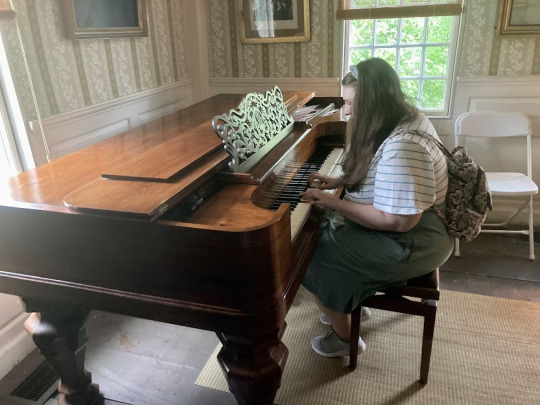
Another cool artifact in the house is a grandfather clock built in Limerick, Ireland, which still keeps accurate time when wound, and which stands in the original position in the house that it has occupied since Waldo’s grandfather purchased it.
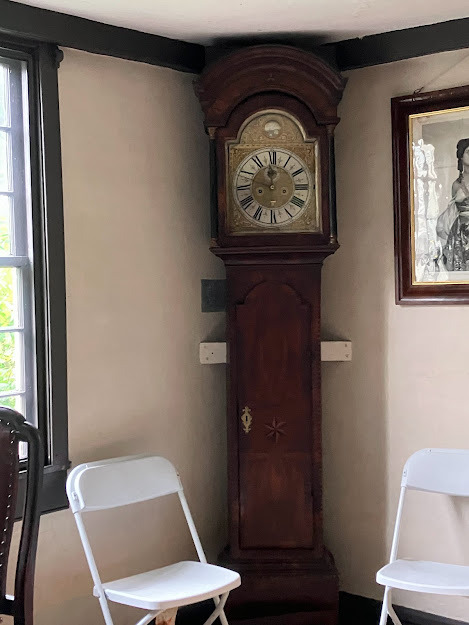
The bookcases in the house are all built horizontally, and stacked on top of each other, unlike today’s bookshelves. Our tour guide told us that this is because the Emerson’s highly valued their tomes and wanted to be able to easily lift and slide the bookshelves out the windows in case of a fire.

And finally, I would be remiss if I failed to mention Longfellow, the preserved owl that resides at The Old Manse. Apparently no one know how he came to be in the house, but Nathanial Hawthorne found him in the attic when he moved in. The owl is believed to be from colonial times, meaning it existed before the house was built. Nathanial loved it and wanted it to be a centerpiece for conversation when guests came over, but Sophia was creeped out by it, leading to an unending “game” where she would hide it back up in the attic, and he would bring it down again and put it in a different room of the house.

After our wonderful tour of The Old Manse, we stopped for a quick bit to eat at Main Streets Café, where I had a mac ‘n cheese grilled cheese sandwich. That’s right folks, deep fried mac ‘n cheese wedges on a sandwich with even more delicious, cheesy gooiness. Highly recommend.

With our bellies full, we headed over to Emerson House, the home Emerson lived in with his second wife and four children. Emerson House is massive! There are so many rooms and split-levels and doors that lead who knows where. You could get lost in there without a tour guide, but luckily we had a team of lovely women to lead us through the house both physically and historically.
Unfortunately, you can’t take pictures inside Emerson House, but here’s me standing out front in the rain.
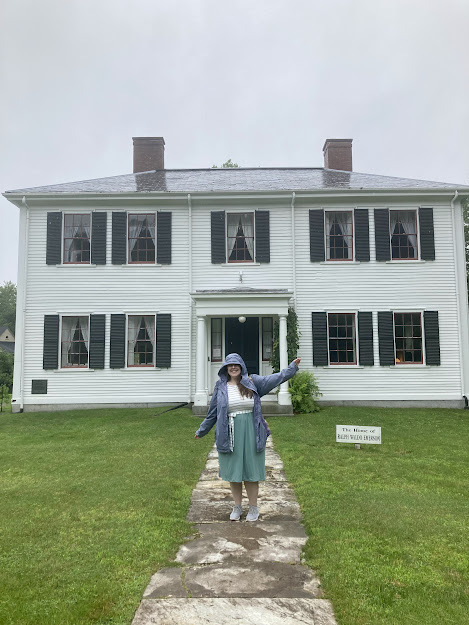
One of the coolest things about Emerson house is that, unlike the other authors’ homes in the areas which are all owned by trusts or preservation societies, Emerson House is still owned by direct descendants of Waldo. They take care of the upkeep and allow the Ralph Waldo Emerson Memorial Association to give tours.
Here are some interesting facts we learned about Emerson and his home, in no particular order:
In July 1872, a fire broke out in the attic of the home. Luckily, no one was injured, and they even managed to get all of the furniture (and more importantly, all of the books!) out in time. (Possible due to easily yeet-able bookshelves?) Due to smoke and water damage, the house was unlivable for a time. Emerson did have the house insured, but the whole town banded together to raise additional funds for restoring the home. Different neighbors also volunteered to keep the family’s belongings safe until the home was livable again. While the house was being reconstructed, Emerson and his daughter traveled to Europe and Egypt, and when they returned, the town had a celebration in their honor, and even closed schools for the day!
Waldo was at least six feet tall, and as such would have to duck in some of the lower hallways of the home. He hung his gardening hat on a peg which only he was tall enough to reach.
The Emersons entertained visitors from all over, and Waldo almost never turned away guests, even unannounced ones. He was very generous if people asked for money, and never let anyone leave without a meal.
As a friend of Waldo, Henry David Thoreau lived in the house for long spans of time on multiple occasions. He typically stayed in the room that was meant to be for Waldo’s brother Charles, who tragically died before his wedding. It took Waldo 10 years to finish the room and eventually make it the master bedroom, but Thoreau stayed there frequently. He was a fan favorite of Emerson’s four children, who could often see him approaching the carriage entrance from their window in the nursery. They loved him because he made good popcorn and told good stories.
Waldo was a great friend to the Alcott family. He allowed Louisa May Alcott to use his library and often gave her book recommendations. Alcott’s first book, Flower Fables, is dedicated to Waldo’s daughter, Ellen. Waldo also lent many pieces of art to Louisa’s sister, the artist May Alcott, including one piece that was a wedding gift! She would make copies of the paintings, a common practice for aspiring artists at the time.
And finally, every single room in Emerson House has at least one bookshelf. That right there is life goals.
Right across the street from Emerson House is the Concord Museum, so that was our next stop. This museum has many interactive exhibits and mainly focuses on Concord’s Revolutionary War history, although it does also have a fair share of local author and artist history, as well.
One of the first things you encounter in the museum’s foyer is a replica of Thoreau’s writing desk, which you can sit at and write in a little notebook there.
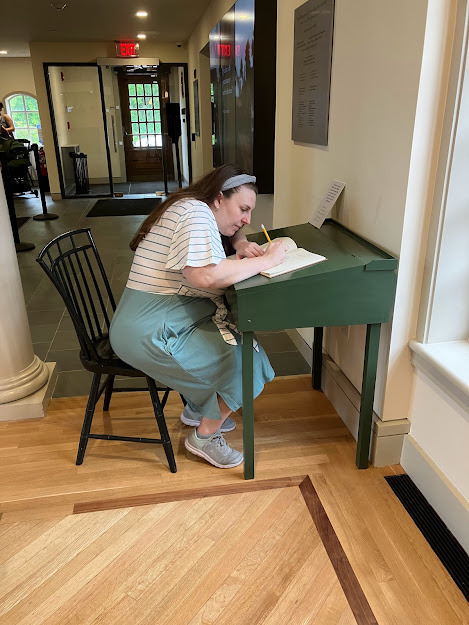
The original green desk is in one of the galleries as you walk through.
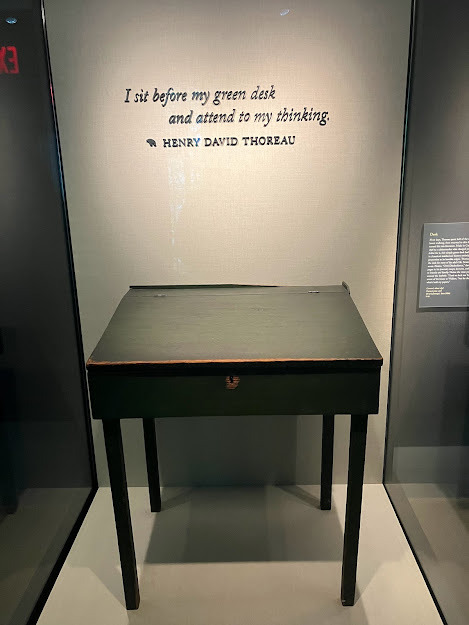
The museum also has many odds and ends from the different local authors. One is Emerson’s writing desk, which was originally green, but then he later painted it black. The replica that resides at The Old Manse is green.

One of Louisa May Alcott’s tea kettles, which she brought with her when she served as a Civil War nurse, is also at the museum.

Also on display is the entirety of Emerson’s study, displayed exactly as they were in his lifetime. Everything in the room is the original!

Finally, there is a room dedicated to Thoreau’s belongings, including his bed frame, a wooden flute, and some pencils and surveying tools.
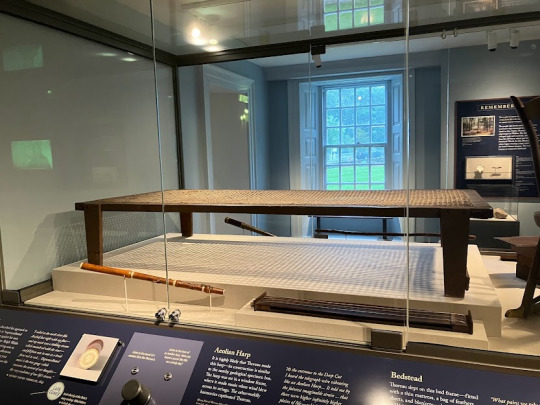
A large portion of the Concord population were abolitionists, and although she was not a native of Concord, the museum does have a first edition of Harriet Beecher Stowe’s Uncle Tom’s Cabin, which was originally published in two volumes.

We were lucky enough to be visiting during the Concord Free Public Library’s 150 Years of Art Celebration, so there was a special exhibit with art pieces that are usually at the library. This included busts of Hawthorne, Thoreau, and Alcott, as well as one of May Alcott’s paintings. The largest piece in the library’s collection is a portrait of Emerson, with a rainbow in the background.



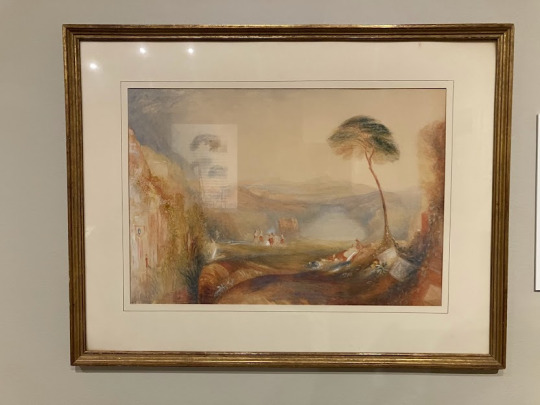

After leaving the museum, we browsed for a bit at Concord Bookshop and then drove over to Walden Pond once it finally stopped raining. There, we were able to visit the replica of Thoreau’s writing cabin, which is very small! The original cabin was located on the other side of the pond, but is no longer standing. Visitors who are into hiking can hike up to the point where the cabin once stood and where many admirers leave rocks as a sign that they’ve been there. (Not me and Jessica. We’re indoor people!)
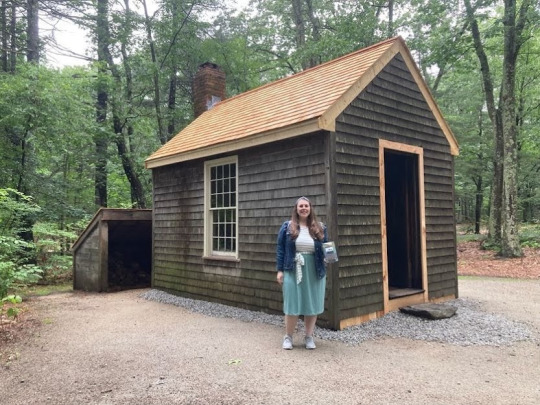
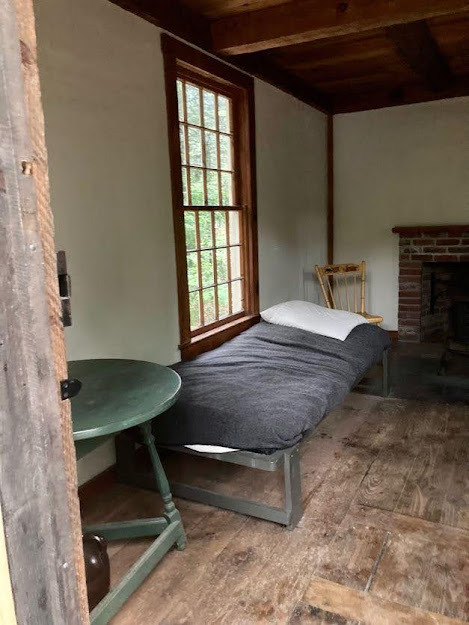
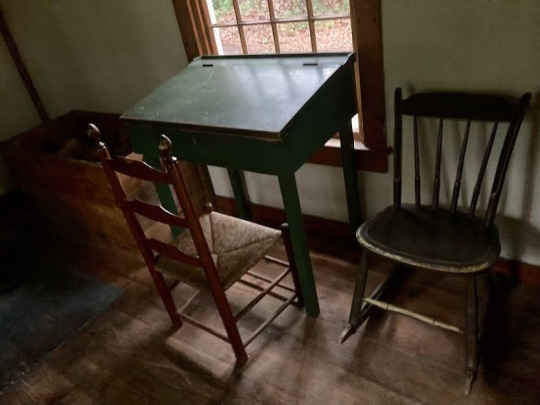
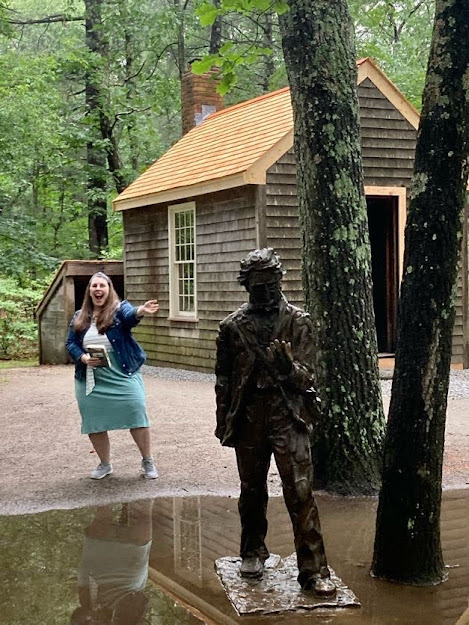
We ended our night with some sushi at Karma (highly recommend the Golden Banana Roll...banana and eel, who knew?!), and ice cream at Bedford Farms, where their “small” is my “large”.

In two and a half days, we managed to squeeze in every literary and historical attraction that we planned for, which is pretty impressive, especially considering the rain. It was definitely made easier by the fact that everything in Concord is so close to each other.
Before we head home tomorrow, we hope to stop by the North Bridge, the site of the beginning of the American Revolution. Hopefully the rain will hold up long enough to let us walk to the bridge and see Daniel Chester French’s Minute Man statue.
Stay tuned for more literary/historical adventures!
<3 Theresa
#totallylitroadtrips#totally lit road trips#totallylitroadtrip#totally lit road trip#concord#massachusetts#the old manse#emerson house#concord museum#ralph waldo emerson#nathaniel hawthorne#louisa may alcott#henry david thoreau#walden pond
0 notes
Text
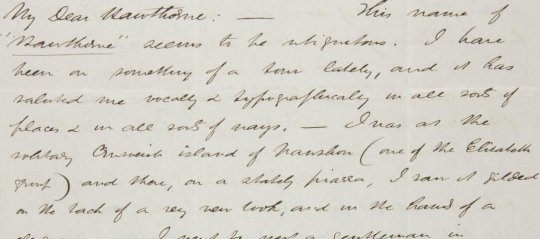

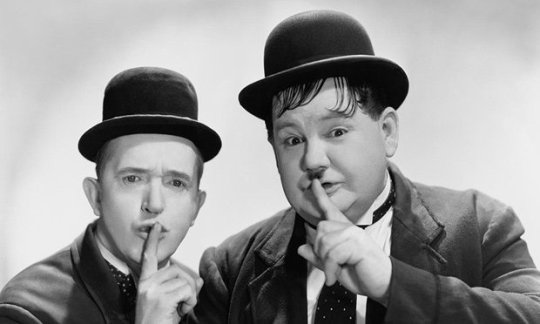
Read a (Love) Letter From Herman Melville to Nathaniel Hawthorne
There has been much speculation about this friendship.
Literary Hub Emily Temple
In 1850, Ticknor, Reed & Fields published The Scarlet Letter, Nathaniel Hawthorne’s classic novel of repentance and slut-shaming. But this isn’t about The Scarlet Letter—it’s about one of the most fascinating friendships in literature. Because whenever I think of Nathaniel Hawthorne, I can’t help but think of Herman Melville.
Hawthorne and Melville met in 1850, and though Hawthorne was fifteen years older, and the two very different (Melville bombastic and highly emotional, Hawthorne much more reserved) the two hit it off right away. Soon afterwards, Melville published a very complimentary review of Hawthorne’s Mosses from an Old Manse, and the writers began an intense friendship that would last about two years before unexpectedly dissolving. There has been much speculation about this friendship, of course, and whether it may have been something more. As Jordan Alexander Stein put in in LARB, “All we are left with are representations of Melville’s feelings, tantalizingly expressed without being particularly easy to pinpoint. Melville wrote of Hawthorne with undeniably sexy language. What proves more elusive are the feelings to which, with any precision, this language can be said to refer.”
For instance, in that aforementioned review, Melville writes: “[A]lready I feel that this Hawthorne has dropped germinous seeds into my soul. He expands and deepens down, the more I contemplate him; and further, and further, shoots his strong New England roots into the hot soil of my Southern soul.” Which sounds like, well, you know.
But one of the best examples of this is the wildly flirtatious, possibly scandalous (magnets indeed), letter below. After Hawthorne read Moby-Dick—which was dedicated to him—he sent Melville a letter. That letter has not survived (nor any of Hawthorne’s letters to Melville—which begs the question: why did Melville destroy these?, but anyway), but Melville’s response, written in November of 1851, suggests that his friend rather liked his novel. So is it a love letter? Even if they were never more than friends, I’d have to say yes. I mean, “Knowing you persuades me more than the Bible of our immortality,” and “I feel that the Godhead is broken up like the bread at the Supper, and that we are the pieces”? Damn. Romantic or not, that’s some passionate correspondence.
Pittsfield, Monday afternoon.
My Dear Hawthorne:
People think that if a man has undergone any hardship, he should have a reward; but for my part, if I have done the hardest possible day’s work, and then come to sit down in a corner and eat my supper comfortably—why, then I don’t think I deserve any reward for my hard day’s work—for am I not now at peace? Is not my supper good? My peace and my supper are my reward, my dear Hawthorne. So your joy-giving and exultation-breeding letter is not my reward for my ditcher’s work with that book, but is the good goddess’s bonus over and above what was stipulated—for for not one man in five cycles, who is wise, will expect appreciative recognition from his fellows, or any one of them. Appreciation! Recognition! Is love appreciated? Why, ever since Adam, who has got to the meaning of this great allegory—the world? Then we pygmies must be content to have our paper allegories but ill comprehended. I say your appreciation is my glorious gratuity. In my proud, humble way,—a shepherd-king,—I was lord of a little vale in the solitary Crimea; but you have now given me the crown of India. But on trying it on my head, I found it fell down on my ears, notwithstanding their asinine length—for it’s only such ears that sustain such crowns.
Your letter was handed me last night on the road going to Mr. Morewood’s, and I read it there. Had I been at home, I would have sat down at once and answered it. In me divine maganimities are spontaneous and instantaneous—catch them while you can. The world goes round, and the other side comes up. So now I can’t write what I felt. But I felt pantheistic then—your heart beat in my ribs and mine in yours, and both in God’s. A sense of unspeakable security is in me this moment, on account of your having understood the book. I have written a wicked book, and feel spotless as the lamb. Ineffable socialities are in me. I would sit down and dine with you and all the gods in old Rome’s Pantheon. It is a strange feeling—no hopefulness is in it, no despair. Content—that is it; and irresponsibility; but without licentious inclination. I speak now of my profoundest sense of being, not of an incidental feeling.
Whence come you, Hawthorne? By what right do you drink from my flagon of life? And when I put it to my lips—lo, they are yours and not mine. I feel that the Godhead is broken up like the bread at the Supper, and that we are the pieces. Hence this infinite fraternity of feeling. Now, sympathizing with the paper, my angel turns over another page. you did not care a penny for the book. But, now and then as you read, you understood the pervading thought that impelled the book—and that you praised. Was it not so? You were archangel enough to despise the imperfect body, and embrace the soul. Once you hugged the ugly Socrates because you saw the flame in the mouth, and heard the rushing of the demon,—the familiar,—and recognized the sound; for you have heard it in your own solitudes.
My dear Hawthorne, the atmospheric skepticisms steal into me now, and make me doubtful of my sanity in writing you thus. But, believe me, I am not mad, most noble Festus! But truth is ever incoherent, and when the big hearts strike together, the concussion is a little stunning. Farewell. Don’t write a word about the book. That would be robbing me of my miserly delight. I am heartily sorry I ever wrote anything about you—it was paltry. Lord, when shall we be done growing? As long as we have anything more to do, we have done nothing. So,now, let us add Moby Dick to our blessing, and step from that. Leviathan is not the biggest fish;—I have heard if Krakens.
This is a long letter, but you are not at all bound to answer it. Possibly, if you do answer it, and direct it to Herman Melville, you will missend it—for the very fingers that now guide this pen are not precisely the same that just took it up and put it on this paper. Lord, when shall we be done changing? Ah! it’s a long stage, and no inn in sight, and night coming, and the body cold. But with you for a passenger, I am content and can be happy. I shall leave the world, I feel, with more satisfaction for having come to know you. Knowing you persuades me more than the Bible of our immortality.
What a pity, that, for your plain, bluff letter, you should get such gibberish! Mention me to Mrs. Hawthorne and to the children, and so, good-by to you, with my blessing.
Herman.
P.S. I can’t stop yet. If the world was entirely made up of Magians, I’ll tell you what I should do. I should have a paper-mill established at one end of the house, and so have an endless riband of foolscap rolling in upon my desk; and upon that endless riband I should write a thousand—a million—billion thoughts, all under the form of a letter to you. The divine magnet is on you, and my magnet responds. Which is the biggest? A foolish question—they are One.
P.P.S. Don’t think that by writing me a letter, you shall always be bored with an immediate reply to it—and so keep both of us delving over a writing-desk eternally. No such thing! I sh’n’t always answer your letters, and you may do just as you please.
Emily Temple is the managing editor at Lit Hub. Her first novel, The Lightness, was published by William Morrow/HarperCollins in June 2020. You can buy it here.
https://getpocket.com/explore/item/read-a-love-letter-from-herman-melville-to-nathaniel-hawthorne?utm_source=pocket-newtab
0 notes
Text
She must pass heavily, with that broken heart, across the borders of Time she must bathe her hurts in some fount of paradise, and forget her grief in the light of immortality, and there be well.
Nathaniel Hawthorne, Rappaccini’s Daughter (Mosses from an Old Manse)
#Mosses from an Old Manse#Rappaccini’s Daughter#Nathaniel Hawthorne#American literature#Literature#🦎
23 notes
·
View notes
Text
They stood, as it were, in an utter solitude, which would be made none the less solitary by the densest throng of human life.
Nathaniel Hawthorne, Mosses from an Old Manse; from 'Rappaccini's Daughter'
96 notes
·
View notes
Quote
Twenty-four hours have elapsed since writing the foregoing. I have just returned from the hay mow, charged more and more with love and admiration of Hawthorne. For I have just been gleaning through the 'Mosses,' picking up many things here and there that had previously escaped me. And I found that but to glean after this man, is better than to be in at the harvest of others. To be frank (though, perhaps, rather foolish), notwithstanding what I wrote yesterday of these Mosses, I had not then culled them all; but had, nevertheless, been sufficiently sensible of the subtle essence, in them, as to write as I did. To what infinite height of loving wonder and admiration I may yet be borne, when by repeatedly banquetting on these Mosses, I shall have thoroughly incorporated their whole stuff into my being, --that, I can not tell. But already I feel that this Hawthorne has dropped germinous seeds into my soul. He expands and deepens down, the more I contemplate him; and further, and further, shoots his strong New-England roots into the hot soil of my Southern soul.
Herman Melville in his essay “Hawthorne and His Mosses” (a review of Nathaniel Hawthorne’s short story collection Mosses from an Old Manse) from The Literary World, August 1850
#i think about melville's love for hawthorne every now and then#herman melville#quotes#nathaniel hawthorne#hawthorne and his mosses#mosses from an old manse#literary reviews#the literary world#literature#writing
3 notes
·
View notes
Photo
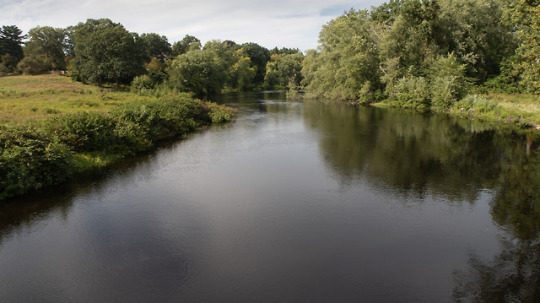
Nov 17, 2018 -the view north of the Concord River from the North Bridge -taken Sept 17, 2018
"It may well be called the Concord--the river of peace and quietness--for it is certainly the most unexcitable and sluggish stream that ever loitered, imperceptibly towards its eternity, the sea. Positively, I had lived three weeks beside it, before it grew quite clear to my perception which way the current flowed. It never has a vivacious aspect, except when a north-western breeze is vexing."
Nathaniel Hawthorne(1804-1864), "Mosses from an Old Manse (1846)"
#concord river#north bridge#nathaniel hawthorne#mosses from an old manse#old manse#concord#massachusetts#new england
10 notes
·
View notes
Text
Sunday 20th July 1828
8 10/60
2
Q
Cleaned teeth and a very little motion then some time talking to her and got into bed again for twenty minutes and finally up at nine –
Breakfast at 10 ¼ - we have really been made very comfortable here – our dinners nicely cooked and clean beds – our landlord, Angus Cameron, yesterday recognised Miss McLean remembered herself long since in Charlotte Square Edinburgh – delighted to see her – 20 years since he settled here, on Friday. 1 of his sons drove us yesterday – off at 11 ¼ to cross the ferry – the little white inn on the South side, the ferry kept too by an Angus Cameron, but born Angus Mc. Master and changed his name because he liked Cameron better -
In the cart and off from the South side the ferry at 11 25/60 – fine drive along Loch Leven – surrounding mountains very fine - At 12 40/60 having for sometime lost sight of the loch ‘Duror Inn’ nice little white Inn – apparently plenty of good stabling – a gig standing out near the stabling at a little distance from the house – surely one might sleep there comfortably – nice neat white church and school house ? manse? and a row of 3 or 4 white blue slated cottages and scattered straw thatched (the thatch everywhere here abouts kept down with long sticks or sometimes straw cords) huts, and stream and nice green wooded glen – Glen Duror –
At 12 50/60 crossed 1 arch stone bridge over the Duror water and (left) another of those upright stones (memorial stones?) as at Altyre near Forres and views of Loch Leven again – at 1 leave Glen Duror, come down upon Loch Linnhe and pursue our road close along the water’s edge – very fine drive – the Loch and down to its western edge the lofty rugged bare [precipitous] mountains of Ardgour, very fine – at 1 50/60 road still along the water’s edge, shaded (left) by the word of Appin house Robert Dowie Esquire M.P. (Scottish Tourist 381/415) who according to Miss McLean made his money in India – a low mean, vulgar man – at 2, green bare Shuna, divided from us by very narrow water observed the blocks of micaceous granite and at 2 5/60 gate to Appin – at a little distance farther on, the other entrance gate – goodish white, 3 story house – handsomish grounds –
At 2 20/60 at the south end of Shuna and at 2 25/60 Trossachy head (north end) of Lismore (Scottish Tourist 381/415 and 275-6/415) and ruin of Stalker castle (381/415) square tower on little low rock just big enough for it and surrounded by the loch, tho’ near shore (must be very shallow water) and near to us – finely situated – loch and its mountains and Lismore and little inlets very fine – at 2 27/60 down on the little white Inn of Portnacroish (F.McColl) with its ferry and village – a few little white blue slated cottages ditto ditto church and manse – look back upon the loch fine – leave it behind and enter Invernahacil glen – rather wooded fertile enough – neat straw thatched cottages and a few scattered neat white houses – at 2 ¾ Aunette Lodge neat little rather gothicized place built about 20 years ago by Campbelle of Lochend who ruined himself and went with his wife and 12 children 4 or 5 years ago to new Holland – the property sold 2 or 3 times – little white church at a little distance from Aunette Lodge and a little farther forward (left) peat moss and peat stacks –
At 2 50/60, road glen Haeil (hae pronounced) – at 3 turn rather round and come in sight of Loch Creran, and at 3 25/60 alight (to bait – no horse to be had on the other side) at Sheun ferry house D.Calquhoun – nice looking enough little 2 story white house outside – but nobody ever stops here and curious place within – on going upstairs queer poor beds in the 2 goodish front rooms – no furniture – straw on bedstocks in a little dark sort of closet not a chamber pot in the house – everybody obliged to go outside. From 3 ½ to 4 ½ wrote out the above of today – off from Shean ferry house (north) at 4 50/60 – 5 minutes getting all into the boat – over in 26 minutes – rained all the way till just at the last and we sat under the cart for shelter – landed at 5 21/60 off again in the cart at 5 ½ very poor place on this side the ferry merely 2 cottages under 1 roof 1 for drams, the both for tea tobacco and snuff – Loch Curan pretty little loch, finely surrounded by magnificent groups of mountains towards the head of the lock and Glencoe the look back up the loch towards this way and on [?] right the mountains have seen nothing finer –
At 5 10/60 lose sight of Loch Creran and see Lock Nell house (General Campbell) and the little loch Nell whence the name of the house and Estate – at 5 55/60 pass the neat entrance lodge – large, good looking house – beautiful place says Miss McLean certainly handsome looking well wooded – the view from the towers (summer house) on the torso of the high wooded ridge jutting out from the house and forming the west side of the little must be very fine – Miss McLean says, it is very fine – began to rain about 6 – at 6 10/60 little picturesque village and fine bold rocks just above us right – at 6 ¼ site of the old Bergonium (left) vide Scottish Tourist page 268 Dunstaffnage castle in view and soon after you the sound of mull and very fine lines of surrounding coast mountains – but alas! it now (6 ¼) rained heavily and without intermission till we alighted for shelter at Connel ferry house at 6 ¾ - luckily not wet beneath our coats and cloaks and sent these to be dried and ordered tea –
General Campbell maternal uncle to Miss Sarah Riddle – divorced his first wife, widow of Sir George Ramsay, by mutual consent on account of bad temper – he continued to keep away from her for 7 years – she begged him to return – he refused and she divorced him for non adherence to conjugal duties declaring when it was over there was no man she would sooner than Duncan Campbell i.e. her late husband by Lochnell who then married a sister of the present Sire Peter Murray, Ochtertyre, near Crieff – no children by either wife – a 5th cousin must have the estate – the branch gone to the dogs by low marriages &c – brought up a son and put him in the army – expelled – a great raff – died of drinking – Locknell took his son at 5 year old and brings him up not allowing him to see his mother grandfather still living, or any of his family –
At 7 ½ had just written the last 25 lines – tea at 7 50/60- off again for Connel ferry (north) at 8 ¾ - 10 minutes in crossing Loch Etive tame in comparison with the magnificent mountain surrounded Loch Creran – seated in our cart again and off from the south side the ferry (merely a cottage for the ferry house) at 9 – soon lose sight of the loch Drearyish up and down hill road have shut out by rock and moor – very fine rocks (right) close to Oban where we alighted at the New Inn, Argyle Arms A. Menzies (pronounced mingis) – several showers this morning from Ballahulish to Shean ferry – heavy rain enough from there and from Loch Null to Connal ferry and rain but not much from Connel to Oban – just upon leaving Shean ferry house heard the rumbling of thunder
Went to her bed double bedded room at twelve and a half, she was feckless and not quite well, talking quietly for a good while then she not objecting at heart had a kiss better to her than usual good to me – and went to my own bed after washing myself at two
Ballahulish ferry (north) to Shean ferry (north) 16
Shean ferry (north) to Connel ferry north) 5
Connel ferry (north) to Oban 5
(Dairy reference: SH7MLE110036)
3 notes
·
View notes
Text
Every time Dany mentions home
*Buckle in kids, this is a long one*
“At first the magisters and archons and merchant princes were pleased to welcome the last Targaryens to their homes and tables, but as the years passed and the Usurper continued to sit upon the Iron Throne, doors closed and their lives grew meaner. Years past they had been forced to sell their last few treasures, and now even the coin they had gotten from Mother's crown had gone. In the alleys and wine sinks of Pentos, they called her brother "the beggar king." Dany did not want to know what they called her.” - Dany I, GoT
“Dany looked at Khal Drogo. His face was hard and cruel, his eyes as cold and dark as onyx. Her brother hurt her sometimes, when she woke the dragon, but he did not frighten her the way this man frightened her. "I don't want to be his queen," she heard herself say in a small, thin voice. "Please, please, Viserys, I don't want to, I want to go home." "Home!" He kept his voice low, but she could hear the fury in his tone. "How are we to go home, sweet sister? They took our home from us!" He drew her into the shadows, out of sight, his fingers digging into her skin. "How are we to go home?" he repeated, meaning King's Landing, and Dragonstone, and all the realm they had lost.” - Dany I, GoT
“Dany had only meant their rooms in Illyrio's estate, no true home surely, though all they had, but her brother did not want to hear that. There was no homethere for him. Even the big house with the red door had not been home for him. His fingers dug hard into her arm, demanding an answer. "I don't know …" she said at last, her voice breaking. Tears welled in her eyes."I do," he said sharply. "We go home with an army, sweet sister. With Khal Drogo's army, that is how we go home. And if you must wed him and bed him for that, you will." He smiled at her. "I'd let his whole khalasar fuck you if need be, sweet sister, all forty thousand men, and their horses too if that was what it took to get my army. Be grateful it is only Drogo. In time you may even learn to like him. Now dry your eyes. Illyrio is bringing him over, and he will not see you crying.” - Dany I, GoT
“Home," he said. His voice was thick with longing. "I pray for home too," she told him, believing it.” - Dany III, GoT
“He could not lead an army even if my lord husband gave him one," Dany said. "He has no coin and the only knight who follows him reviles him as less than a snake. The Dothraki make mock of his weakness. He will never take us home.” - Dany III, GoT
“She was lying there, holding the egg, when she felt the child move within her … as if he were reaching out, brother to brother, blood to blood. "You are the dragon," Dany whispered to him, "the true dragon. I know it. I know it." And she smiled, and went to sleep dreaming of home.” - Dany IV, GoT
“The Dothraki do things in their own time, for their own reasons," the knight answered. "Have patience, Princess. Do not make your brother's mistake. We will go home, I promise you."Home? The word made her feel sad. Ser Jorah had his Bear Island, but what was home to her? A few tales, names recited as solemnly as the words of a prayer, the fading memory of a red door … was Vaes Dothrak to be her home forever? When she looked at the crones of the dosh khaleen, was she looking at her future?” - Dany VI, GoT
“If I were not the blood of the dragon, she thought wistfully, this could be my home. She was khaleesi, she had a strong man and a swift horse, handmaids to serve her, warriors to keep her safe, an honored place in the dosh khaleen awaiting her when she grew old … and in her womb grew a son who would one day bestride the world. That should be enough for any woman … but not for the dragon. With Viserys gone, Daenerys was the last, the very last. She was the seed of kings and conquerors, and so too the child inside her. She must not forget.” - Dany VI, GoT
“But the Western Market smelled of home.” - Dany VI, GoT
“Under the hollow hummock of earth that was her home in Vaes Dothrak, Dany ordered them to leave her—all but Ser Jorah. "Tell me," she commanded as she lowered herself onto her cushions. "Was it the Usurper?" - Dany VI, GoT
“Her words were a knife through Dany's breast. What had she ever done to make the gods so cruel? She had finally found a safe place, had finally tasted love and hope. She was finally going home. And now to lose it all … "No," she pleaded. "Save him, and I will free you, I swear it. You must know a way … some magic, some …" - Dany VIII, GoT
“She saw sunlight on the Dothraki sea, the living plain, rich with the smells of earth and death. Wind stirred the grasses, and they rippled like water. Drogo held her in strong arms, and his hand stroked her sex and opened her and woke that sweet wetness that was his alone, and the stars smiled down on them, stars in a daylight sky. "Home," she whispered as he entered her and filled her with his seed, but suddenly the stars were gone, and across the blue sky swept the great wings, and the world took flame.” - Dany IX, GoT
“The door loomed before her, the red door, so close, so close, the hall was a blur around her, the cold receding behind. And now the stone was gone and she flew across the Dothraki sea, high and higher, the green rippling beneath, and all that lived and breathed fled in terror from the shadow of her wings. She could smell home, she could see it, there, just beyond that door, green fields and great stone houses and arms to keep her warm, there. She threw open the door.”
- Dany IX, GoT
“Saved me?" The Lhazareen woman spat. "Three riders had taken me, not as a man takes a woman but from behind, as a dog takes a bitch. The fourth was in me when you rode past. How then did you save me? I saw my god's house burn, where I had healed good men beyond counting. My home they burned as well, and in the street I saw piles of heads. I saw the head of a baker who made my bread. I saw the head of a boy I had saved from deadeye fever, only three moons past. I heard children crying as the riders drove them off with their whips. Tell me again what you saved.” - Dany IX, GoT
“As my queen commands." Ser Jorah frowned. "My home . . . you must understand that to understand the rest. Bear Island is beautiful, but remote. Imagine old gnarled oaks and tall pines, flowering thornbushes, grey stones bearded with moss, little creeks running icy down steep hillsides. The hall of the Mormonts is built of huge logs and surrounded by an earthen palisade. Aside from a few crofters, my people live along the coasts and fish the seas. The island lies far to the north, and our winters are more terrible than you can imagine, Khaleesi.” - Dany I, ACoK
“A fortnight was how long it took us to sail from Lannisport back to Bear Island. My home was a great disappointment to Lynesse. It was too cold, too damp, too far away, my castle no more than a wooden longhall. We had no masques, no mummer shows, no balls or fairs. Seasons might pass without a singer ever coming to play for us, and there's not a goldsmith on the island. Even meals became a trial. My cook knew little beyond his roasts and stews, and Lynesse soon lost her taste for fish and venison.” - Dany I, ACoK
“She had heard the longing in Ser Jorah's voice when he spoke of his Bear Island. He can never have me, but one day I can give him back his home and honor. That much I can do for him.” - Dany I, ACoK
“Pyrat Pree conducted her little khalasar down the center of a great arcade where the city's ancient heroes stood thrice life-size on columns of white and green marble. They passed through a bazaar in a cavernous building whose latticework ceiling was home to a thousand gaily colored birds. Trees and flowers bloomed on the terraced walls above the stalls, while below it seemed as if everything the gods had put into the world was for sale.” - Dany II, ACoK
“Xaro Xhoan Daxos had offered Dany the hospitality of his home while she was in the city. She had expected something grand. She had not expected a palace larger than many a market town. It makes Magister Illyrio's manse in Pentos look like a swineherd's hovel, she thought. Xaro swore that his home could comfortably house all of her people and their horses besides; indeed, it swallowed them. An entire wing was given over to her. She would have her own gardens, a marble bathing pool, a scrying tower and warlock's maze. Slaves would tend her every need. In her private chambers, the floors were green marble, the walls draped with colorful silk hangings that shimmered with every breath of air. "You are too generous," she told Xaro Xhoan Daxos.”
- Dany II, ACoK
“Ser Jorah, find the docks and see what manner of ships lay at anchor. It has been half a year since I last heard tidings from the Seven Kingdoms. Perhaps the gods will have blown some good captain here from Westeros with a ship to carry us home.” - Dany II, ACoK
“The thought of home disquieted her. If her sun-and-stars had lived, he would have led his khalasar across the poison water and swept away her enemies, but his strength had left the world. Her bloodriders remained, sworn to her for life and skilled in slaughter, but only in the ways of the horselords. The Dothraki sacked cities and plundered kingdoms, they did not rule them. Dany had no wish to reduce King's Landing to a blackened ruin full of unquiet ghosts. She had supped enough on tears. I want to make my kingdom beautiful, to fill it with fat men and pretty maids and laughing children. I want my people to smile when they see me ride by, the way Viserys said they smiled for my father.”
- Dany II, ACoK
“I have given you my home and heart, do they mean nothing to you? I have given you perfume and pomegranates, tumbling monkeys and spitting snakes, scrolls from lost Valyria, an idol's head and a serpent's foot. I have given you this palanquin of ebony and gold, and a matched set of bullocks to bear it, one white as ivory and one black as jet, with horns inlaid with jewels.” - Dany III, ACoK
“I am half a world away from my kingdom even here. If I go any farther east I may never find my way home to Westeros.” - Dany III, ACoK
“She fled from him, but only as far as the next open door. I know this room, she thought. She remembered those great wooden beams and the carved animal faces that adorned them. And there outside the window, a lemon tree! The sight of it made her heart ache with longing. It is the house with the red door, the house in Braavos. No sooner had she thought it than old Ser Willem came into the room, leaning heavily on his stick. "Little princess, there you are," he said in his gruff kind voice. "Come," he said, "come to me, my lady, you're home now, you're safe now." His big wrinkled hand reached for her, soft as old leather, and Dany wanted to take it and hold it and kiss it, she wanted that as much as she had ever wanted anything. Her foot edged forward, and then she thought, He's dead, he's dead, the sweet old bear, he died a long time ago. She backed away and ran.” - Dany IV, ACoK
“All the brass in this booth is not worth twenty honors," Dany told him as she studied the reflections. The old man had the look of Westeros about him, and the brown-skinned one must weigh twenty stone. The Usurper offered a lordship to the man who kills me, and these two are far from home. Or could they be creatures of the warlocks, meant to take me unawares?”
- Dany V, ACoK
“Three heads has the dragon, Dany thought, wondering. "I shall tell my people to make ready to depart at once. But the ships that bring me home must bear different names." - Dany V, ACoK
“But that time was not yet come. Rhaegal and Viserion were the size of small dogs, Drogon only a little larger, and any dog would have out-weighed them; they were all wings and neck and tail, lighter than they looked. And so Daenerys Targaryen must rely on wood and wind and canvas to bear her home.” - Dany I, ASoS
“Mero tossed down his wine straightaway, wiped his mouth with the back of his hand, and leered at Dany. "I believe I fucked your twin sister in a pleasure house back home. Or was it you?” - Dany IV, ASoS
“Varys said . . . I might go home." He bowed his head.I was going to take you home! Her dragons sensed her fury. Viserion roared, and smoke rose grey from his snout. Drogon beat the air with black wings, and Rhaegal twisted his head back and belched flame. I should say the word and burn the two of them. Was there no one she could trust, no one to keep her safe? "Are all the knights of Westeros so false as you two? Get out, before my dragons roast you both. What does roast liar smell like? As foul as Brown Ben's sewers? Go!” - Dany V, ASoS
“No. I must hold court soon." Dany had grown very fond of Missandei. The little scribe with the big golden eyes was wise beyond her years. She is brave as well. She had to be, to survive the life she's lived. One day she hoped to see this fabled isle of Naath. Missandei said the Peaceful People made music instead of war. They did not kill, not even animals; they ate only fruit and never flesh. The butterfly spirits sacred to their Lord of Harmony protected their isle against those who would do them harm. Many conquerors had sailed on Naath to blood their swords, only to sicken and die. The butterflies do not help them when the slave ships come raiding, though. "I am going to take you home one day, Missandei," Dany promised. If I had made the same promise to Jorah, would he still have sold me? "I swear it.” - Dany VI, ASoS
“Leave him be. The scales are balanced now. Let him go home." Dany pictured Jorah moving amongst old gnarled oaks and tall pines, past flowering thornbushes, grey stones bearded with moss, and little creeks running icy down steep hillsides. She saw him entering a hall built of huge logs, where dogs slept by the hearth and the smell of meat and mead hung thick in the smoky air. "We are done for now," she told her captains.” - Dany VI, ASoS
“They could not feed him his own genitals. The Astapori left him neither root nor stem. "The Sons grow bolder," Dany observed. Until now, they had limited their attacks to unarmed freedmen, cutting them down in the streets or breaking into their homes under the cover of darkness to murder them in their beds. "This is the first of my soldiers they have slain.” - Dany I, ADwD
“Mossador. Dany made a fist. Missandei and her brothers had been taken from their home on Naath by raiders from the Basilisk Isles and sold into slavery in Astapor. Young as she was, Missandei had shown such a gift for tongues that the Good Masters had made a scribe of her. Mossador and Marselen had not been so fortunate. They had been gelded and made into Unsullied. "Have any of the murderers been captured?” - Dany II, ADwD
“Three freedmen, murdered in their homes," the Shavepate said. "A moneylender, a cobbler, and the harpist Rylona Rhee. They cut her fingers off before they killed her." - Dany II, ADwD
“As he loved you." Dany stroked the girl's hair. "Say the word, my sweet, and I will send you from this awful place. I will find a ship somehow and send you home. To Naath.” - Dany II, ADwD
“Kisses came easier than sleep, however. Dany shut her eyes and tried to think of home, of Dragonstone and King's Landing and all the other places that Viserys had told her of, in a kinder land than this … but her thoughts kept turning back to Slaver's Bay, like ships caught in some bitter wind. When Missandei was sound asleep, Dany slipped from her arms and stepped out into the predawn air to lean upon the cool brick parapet and gaze out across the city. A thousand roofs stretched out below her, painted in shades of ivory and silver by the moon.” - Dany II, ADwD
“The truth … but truth was never welcome at that court. I walked from the throne room with my head high, though I did not know where I was going. I had no home but White Sword Tower. My cousins would find a place for me at Harvest Hall, I knew, but I had no wish to bring Joffrey's displeasure down upon them. I was gathering my things when it came to me that I had brought this on myself by taking Robert's pardon. He was a good knight but a bad king, for he had no right to the throne he sat. That was when I knew that to redeem myself I must find the true king, and serve him loyally with all the strength that still remained me." - Dany II, ADwD
“The gift you begged of me in Qarth. Ships. There are thirteen galleys in the bay. Yours, if you will have them. I have brought you a fleet, to carry you home to Westeros.” - Dany III, ADwD
“Of him, little and less. These ships, though … Your Grace, with these ships we might be home before year's end."Dany had never known a home. In Braavos, there had been a house with a red door, but that was all. "Beware of Qartheen bearing gifts, especially merchants of the Thirteen. There is some trap here. Perhaps these ships are rotten, or …” - Dany III, ADwD
“It was good counsel. "Yes, make it so." Westeros. Home. But if she left, what would happen to her city? Meereen was never your city, her brother's voice seemed to whisper. Your cities are across the sea. Your Seven Kingdoms, where your enemies await you. You were born to serve them blood and fire.”
- Dany III, ADwD
“Enough." Dany slapped the table. "No one will be left to die. You are all my people." Her dreams of home and love had blinded her. "I will not abandon Meereen to the fate of Astapor. It grieves me to say so, but Westeros must wait.” - Dany III, ADwD
“Ser Barristan went to one knee before her. "My queen, your realm has need of you. You are not wanted here, but in Westeros men will flock to your banners by the thousands, great lords and noble knights. 'She is come,' they will shout to one another, in glad voices. 'Prince Rhaegar's sister has come home at last.” - Dany III, ADwD
“I am a sailor, not a shipwright. I was sent to fetch Your Grace back to Pentos. Instead you brought us here and tore my Saduleon to pieces for some nails and scraps of wood. I will never see her like again. I may never see my home again, nor my old wife. It was not me who refused the ships this Daxos offered. I cannot fight the Qartheen with fishing boats.” His bitterness dismayed her, so much so that Dany found herself wondering if the grizzled Pentoshi could be one of her three betrayers. No, he is only an old man, far from home and sick at heart. "There must be something we can do.” - Dany V, ADwD
“Ser Barristan will show you out." Dany hurried off, calling for her handmaids. She would not welcome her captain home in a tokar. In the end she tried a dozen gowns before she found one she liked, but she refused the crown that Jhiqui offered her.” - Dany VI, ADwD
“This?" Daario touched his temple. "A crossbowman tried to put a quarrel through my eye, but I outrode it. I was hurrying home to my queen, to bask in the warmth of her smile." He shook his sleeve, spattering red droplets. "This blood is not mine. One of my serjeants said we should go over to the Yunkai'i, so I reached down his throat and pulled his heart out. I meant to bring it to you as a gift for my silver queen, but four of the Cats cut me off and came snarling and spitting after me. One almost caught me, so I threw the heart into his face.” - Dany VI, ADwD
“Instead she slipped into a hooded robe and stepped out onto her terrace. She went to the parapet and stood there gazing down upon the city as she had done a hundred times before. It will never be my city. It will never be my home.” - Dany VII, ADwD
“He will give us these castrati, Dany thought, and then he will march home and make some more. The world is full of boys.” - Dany VIII, ADwD
“No." Dany knew enough of Westerosi history to know that. Nymeria had landed ten thousand ships upon Dorne's sandy shores, but when she wed her Dornish prince she had burned them all and turned her back upon the sea forever. "Dorne is too far away. To please this prince, I would need to abandon all my people. You should send him home." - Dany VIII, ADwD
“Home," said Dany. "Naath. Butterflies and brothers. Tell me of the things that make you happy, the things that make you giggle, all your sweetest memories. Remind me that there is still good in the world.” - Dany VIII, ADwD
“The hill loomed larger down here. Dany had taken to calling it Dragonstone, after the ancient citadel where she'd been born. She had no memories of that Dragonstone, but she would not soon forget this one. Scrub grass and thorny bushes covered its lower slopes; higher up a jagged tangle of bare rock thrust steep and sudden into the sky. There, amidst broken boulders, razor-sharp ridges, and needle spires, Drogon made his lair inside a shallow cave. He had dwelt there for some time, Dany had realized when she first saw the hill. The air smelled of ash, every rock and tree in sight was scorched and blackened, the ground strewn with burned and broken bones, yet it had been home to him. Dany knew the lure of home.” - Dany X, ADwD
“And no matter how far the dragon flew each day, come nightfall some instinct drew him home to Dragonstone. His home, not mine. Her home was back in Meereen, with her husband and her lover. That was where she belonged, surely.” - Dany X, ADwD
“North they flew, beyond the river, Drogon gliding on torn and tattered wings through clouds that whipped by like the banners of some ghostly army. Dany glimpsed the shores of Slaver's Bay and the old Valyrian road that ran beside it through sand and desolation until it vanished in the west. The road home. Then there was nothing beneath them but grass rippling in the wind.” - Dany X, ADwD
“He boasts of bedding me, you mean. But Daario would not have been so foolish as to make such a boast amongst her enemies. It makes no matter. By now the Yunkai'i will be marching home. That was why she had done all that she had done. For peace.” - Dany X, ADwD
“Once she was certain which way was south, she counted off her paces. The stream appeared at eight. Dany cupped her hands to drink. The water made her belly cramp, but cramps were easier to bear than thirst. She had no other drink but the morning dew that glistened on the tall grass, and no food at all unless she cared to eat the grass. I could try eating ants. The little yellow ones were too small to provide much in the way of nourishment, but there were red ants in the grass, and those were bigger. "I am lost at sea," she said as she limped along beside her meandering rivulet, "so perhaps I'll find some crabs, or a nice fat fish." Her whip slapped softly against her thigh, wap wap wap. One step at a time, and the stream would see her home.” - Dany X, ADwD
“The day grew warmer, and the sun beat down upon her head and the burnt remnants of her hair. Water splashed against the soles of her feet. She was walking in the stream. How long had she been doing that? The soft brown mud felt good between her toes and helped to soothe her blisters. In the stream or out of it, I must keep walking. Water flows downhill. The stream will take me to the river, and the river will take me home.Except it wouldn't, not truly. Meereen was not her home, and never would be. It was a city of strange men with strange gods and stranger hair, of slavers wrapped in fringed tokars, where grace was earned through whoring, butchery was art, and dog was a delicacy. Meereen would always be the Harpy's city, and Daenerys could not be a harpy.” - Dany X, ADwD
“For home. Home was all I ever wanted.” - Dany X, ADwD
182 notes
·
View notes